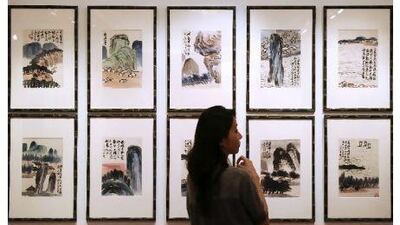The centrepiece of the China Guardian 2012 autumn auction in Beijing last month was an ornate Qing Dynasty sword with a jade handle and a scabbard of rare wood, which sold for a respectable 48.3 million yuan (Dh28.4m).
Much of the irrational exuberance of recent years has gone out of the market but the sword neatly symbolises the rising power of mainland Chinese auction houses in the battle between Hong Kong and the mainland for the biggest share of the Asian art market.
"We want to win over more overseas market and buyers," says Wang Yannan, the president of China Guardian, which is now listed among the globe's top four auction houses.
"The Beijing autumn sales were organised to meet the market and collectors' demand. We chose many of the selections on specific subjects and earned warm feedback from the market," she says.
The slowing global economy has also resulted in fewer record-breaking sales stories from the auctions, and all the auction houses are suffering a fall in revenues. China Guardian's auction sales tally this year dropped 46 per cent to 2.14 billion yuan this spring season, from 3.98bn yuan in last year's autumn auction.
But the market remains solid. Last year, China accounted for nearly 44 per cent of global auction revenue, according to the French government's Conseil des Ventes art market report.
"The autumn sales showed purchasing power remains strong, and the market is stable. The resulting deals were as expected, and inspire confidence in the domestic market. The auction market for artworks is steadily growing," says Ms Wang, whose own political pedigree is impressive - she is the daughter of the former Communist Party leader Zhao Ziyang.
Altogether, more than 3,300 lots, including traditional Chinese ink-and-wash paintings, rare books, porcelain, jade, jewellery and watches, went under the hammer in the Guardian sale at the Beijing International Hotel.
The total take was 1.75bn yuan.
Where giants such as Christie's and Sotheby's have long held sway, the Chinese are now taking aim, particularly in Hong Kong. The sale came not long after China Guardian held its first auction in the former Crown colony last month, another sign of the growing power of mainland China in the regional market. The total turnover was HK$455m (Dh216m).
Hong Kong is now the world's third-largest auction venue with sales of US$1.77 billion (Dh6.5bn) last year.
Its main Chinese rival Poly International, which was formed by the People's Liberation Army in 1993, is also planning its debut Hong Kong sale this month.
Asia's growing armies of rich collectors are drawn to Hong Kong for the sales, which take place twice a year. They come from all over the region, not just mainland China, although many do come from across the border.
The Chinese auctioneers are lured to Hong Kong for a number of reasons, including to take advantage of the city's internationalism and, crucially, its low taxes.
China has drastically cut its import duties on objets d'arts to 6 per cent from 12 per cent since the beginning of the year but a whopping 17 per cent of value-added tax is a major burden for houses and collectors.
The sector was rocked in April by a Chinese customs investigation into tax evasion and a number of prominent art dealers, collectors and artists were investigated.
There are other reasons for moving into Hong Kong. China is clamping down on tax evasion, on fakes and on money laundering, which means Hong Kong's more open regulatory environment is becoming more attractive.
Hong Kong now sells more fine and rare wines than the other two crucial wine-selling cities, New York and London, put together.
The former Crown colony is home to the two most expensive bottles of wine in the world - a pair of 1869 Chateau Lafite worth Dh750,000 each.
Sun Jie, China Guardian's marketing head, says the Hong Kong and Beijing autumn sales both turned out better than expected.
"We believe the Chinese auction market is pretty strong and has good prospects. China's auction market is only about 20 years old, 10 years after the start of economic reform. If we look at our records, in 1994 we had turnover of 74m yuan but by 2011, the annual figure was 11.2bn yuan.
"It grew massively and the market developed fast," says Mr Sun.
"With the current growth of GDP, there will still be people buying luxuries and investing in art. There is still scope for the market to expand.
"Currently, Chinese calligraphy and paintings are the main content at auction, including ancient, contemporary and modern pieces," he adds.
"They account for about 60 per cent, while there is also jade, antique furniture, coins and sculpture, but they are mostly Chinese traditional arts, although there are oil paintings which are based on western styles."
Sotheby's is also moving into the Chinese market with a new 10-year joint venture. Majority controlled by Sotheby's, the new company is a partnership with Beijing GeHua Art Company, a division of the state-run GeHua Cultural and Development Group.
Sotheby's (Beijing) Auction held its first auction at the end of September, the first western auction company to be permitted to do so, and one of the pieces, Self and Self-Shadow, by Wang Huaiqing, went for Dh6.23m.
Meanwhile, faster development is expected from Christie's, which licensed its name to China's Forever International Auction Company back in 2005.

